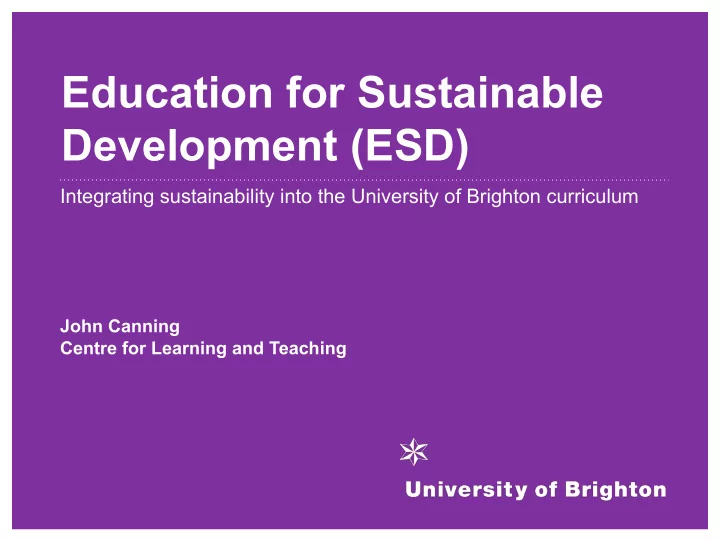

Education for Sustainable Development (ESD) Integrating sustainability into the University of Brighton curriculum John Canning Centre for Learning and Teaching
Sustainability in the UoB strategy “Sustainability is a university value which highlights connections between the principles through encouraging considerations of environmental, ethical and social concerns in the course content, the learning environment, professional life, and through the embedding of generic skills relating to sustainable development”
What are Sustainable Development and Education for Sustainable Development? Many definitions but commonly used ones: • Sustainable development is development that meets the needs of the present without compromising the ability of future generations to meet their own needs. (Bruntland Commission 1987). • Education for sustainable development is the process of equipping students with the knowledge and understanding, skills and attributes needed to work and live in a way that safeguards environmental, social and economic wellbeing, both in the present and for future generations. (QAA 2014).
Key principles • ESD can be integrated into any discipline, subject or professional practice. • Can encompass notions including: • Short and long term climate change • Environmental risks, hazards and disasters. • Global citizenship • A long term future view • Social justice and poverty • Intercultural competence and awareness • Human and non-human health and responses to environmental issues. • Historical, cultural, linguistics, philosophic and religious perspectives.
Discipline examples (from Jones et al ed.) • Nursing: Holistic approaches to human health and health promotion, including mental and spiritual wellbeing. • Law: Impact of legal decisions on communities and cultures. • Drama: Plays or films centred around environmental questions or conflicts. • Business studies: Critical perspectives on sustainability. • Built Environment: Interdisciplinary perspectives on neighbourhood regeneration.
Discipline examples (from Jones et al ed.) Continued: • Linguistics: Language of sustainability and public communication of science. • Economics: Valuation of environmental assets. • Initial Teaching Training: Holistic approaches to teaching science. • Social work: Community health and wellbeing • Geography: Development and regional geographies • Engineering: Group projects on complex or wicked problems. • Media: Communication and reporting on environmental issues.
Other considerations • Your current practice may relate to ESD, even if not labelled as such. • Encouraging critical holistic and interdisciplinary approaches across all subjects. • Giving room for debate and discussion. • Dangers of ‘greenwashing’ the curriculum. • ESD as cultural phenomenon and not only environmental and scientific. • Preparing students of future challenges and futureproofing graduates.
Further reading and guidance • Paula Jones; David Selby and Stephen Sterling (2010 eds.) Sustainability Education: Perspectives and Practice across Higher Education. London: Earthscan. • Poppy Villiers-Stuart and Arran Stibbe (2009, eds.) The Handbook of Sustainability Literacy: multimedia version . http://arts.brighton.ac.uk/stibbe-handbook-of- sustainability (Open access) • Simon Kemp (2012) Higher Education Academy ESD Toolkit https://www.heacademy.ac.uk/enhancement/toolkits/e ducation-sustainable-development-toolkit (Open access) • QAA (2014) Education for sustainable development: Guidance for UK higher education providers. http://www.qaa.ac.uk/en/Publications/Documents/Educ ation-sustainable-development-Guidance-June-14.pdf
Other references • Report of the World Commission on Environment and Development: Our Common Future (1987) http://www.un-documents.net/our-common-future.pdf (Open access) [Bruntland report] • Higher Education Academy resources on ESD https://www.heacademy.ac.uk/enhancement/starter- tools/education-sustainable-development-0
Recommend
More recommend